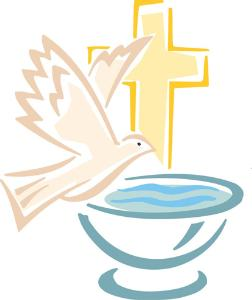There are certain readings in Scripture that encapsulate the Sacramental Life Jesus Christ instituted in His Holy Catholic Church. I believe this reading from Luke is one of those readings. It encapsulates the Sacrament of Baptism in a very particular way that enables us to spiritually enter into the full mystery that we are about to experience.
Let's take a quick review of the characters in this parable. Each of us have been in the role of the victim, prior to our Baptism. We had been robbed of original dignity by the father of lies and left to an existence without the life of grace. But Baptism restores this dignity and births us into the life of grace, it births us into the Sacramental Life of the Church. These children are our victim today.
The Good Samaritan, as you might imagine, is Jesus. He anoints the victim with oil and wine (the wine representing the Sacraments of Initiation which are Baptism, Confirmation, and the Eucharist). He bandages the wounds of the victim (the bandages representing the Christian dignity that comes with Sacramental birth). Today, as we celebrate this Sacrament, Jesus will anoint these children with two different oils. The first is the oil of catechumens, which is used for the anointment of spiritual protection. The other is the Sacred Chrism, which is used for the anointment into the three-fold mission of Christ as priest, prophet, and king. Between the two anointings, of course, is the Baptism itself, where these children will be reborn through water and the Spirit. The bandages in the parable are represented by the white baptismal garments, which these children are already wearing.
In the parable, the Good Samaritan takes the victim to the Inn and asks the Innkeeper to take care of the victim until he returns. Many don't realize this, but the Inn is the Catholic Church and the Innkeeper is the Pope, echoing the three-fold instruction of Jesus to Peter in the Gospel of John to tend to and feed His sheep until He returns at His second coming.
Today, we will mystically retrace the steps of the of the Good Samaritan. Every well-designed Church has the baptismal font at the main entrance. The idea is that through Baptism, we are born into the Sacramental Life of the Church. Once the Baptism at the font is complete, we will do for these children that which the Good Samaritan did for the victim. We will carry them to the altar, just as the Good Samaritan carried the victim to the Inn.
Once at the altar, we will follow the model of Scripture as it relates to the infancy of Jesus. In accord with Jewish tradition, Mary and Joseph presented Jesus to God at the Temple. The Catholic Church has preserved this ancient and Sacred tradition. At the altar, not only will we present these children to God, entrusting them to His care that they may be fortified by the Sacraments of the Holy Catholic Church for the rest of their lives, but we will also give the parents a special blessing, just as Mary received a special blessing from the Temple priests.
Let us begin our spiritual pilgrimage with the Good Samaritan.









